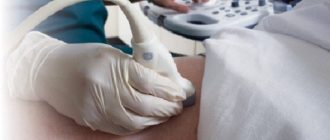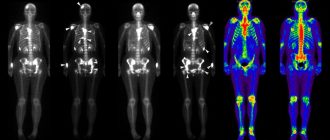A PSA test for prostate adenoma allows you to distinguish a benign tumor from a malignant one, monitor the dynamics of growth or reduction and the effectiveness of treatment. Diagnosis requires donating a small amount of venous blood to a laboratory. Before this, several restrictions are set that must be observed 2-3 weeks before collecting the material. An analysis for prostate specific antigen is quite important; with its help, it is possible to timely diagnose possible oncological processes and monitor the effectiveness of BPH therapy.
Indications
PSA values for prostate adenoma are measured in the following cases:
- detection of compaction or enlargement of the gland upon palpation;
- detection of an increase in prostate size by ultrasound;
- routine examination of men after 40 years of age;
- the presence of characteristic symptoms;
- impossibility of puncture or histology;
- control after therapy or surgery;
- deterioration of general blood count parallel to the proliferation of BPH tissue.
Contraindications
The analysis has no direct contraindications for its implementation, but in some cases the result obtained will be deliberately false:
- Biopsy or laser surgery on the prostate 4-6 weeks before the examination.
- Carrying out cystoscopy, TRUS or palpation of the prostate gland within 2 weeks.
- Less than 6 months after transurethral resection of the gland.
- After colonoscopy or ergometry.
Preparing for analysis
Preparation for tests begins 14 days in advance. To get reliable results you must:
- Avoid hormonal drugs and potency enhancing drugs. If you are taking other medications on a regular basis, you should consult a doctor.
- Refusal of procedures on the prostate gland - palpation, TRUS and massage.
- If there is a catheter in the bladder, it must be removed in advance.
- 2 days before the examination, you must adhere to a dietary diet (without fatty, spicy, smoked and salty foods). Drinking coffee and alcohol is also prohibited.
- For 3 days you need to abstain from sexual intercourse, including masturbation.
- The day before the test, you should refrain from physical activity, stress and smoking.
Change
You need to take a blood test on an empty stomach. The procedure is carried out in any medical institution that has a blood laboratory. The examination is usually scheduled for the first half of the day, since the level of daily fluctuations in prostate antigen is slightly different. It is quite important to be in a calm state and not to succumb to anxiety or nervousness, because sharp negative emotions can affect the results.
Typically, the patient is placed on a chair; if there is a fear of blood sampling or dizziness, the patient is placed lying down. The analysis requires a small amount of blood, usually 5-10 ml. The result will be ready within a day, but if there is a suspicion that it is unreliable, the procedure may be repeated after a short time.
Norms for BPH
PSA test results vary depending on the extent of tissue proliferation. PSA in BPH increases by 0.3 ng/ml for every 1 g of benign tissue, which makes it possible to monitor tumor development. In the case of a malignant tumor, the increase occurs more sharply, by 3.5 ng/ml, which makes it possible to distinguish one pathology from another. In addition, the PSA value changes with age due to the natural enlargement of the gland and the production of antigen.
Dependence of antigen level on age
The normal level of PSA in the blood of men with prostate adenoma for different ages:
- from 40 to 50 years – 2.5 ng/ml;
- from 50 to 59 years – 3.5 ng/ml;
- 60 to 70 years – 4.5 ng/ml;
- over 70 – 6.5 ng/ml.
An elevated PSA level above normal in an adenoma indicates tumor growth, which can lead to the tumor transitioning to a malignant state. In addition, the ratio of free antigen to total is compared; normally it is 15%; at lower values, therapy or surgery is prescribed.
PSA indicators for prostate adenoma during treatment
During treatment of adenoma, the PSA level decreases by 50%. This happens gradually, over a long period of time.
A high level of prostate-specific antigen in BPH after treatment indicates ineffectiveness and the need for surgical intervention.
After removal of hyperplasia
The PSA norm after surgery is 0.2 ng/mg, values up to 0.4 ng/ml are allowed. A higher level of antigen after removal of BPH indicates malignancy or recurrence of the disease. The indicator returns to normal 4-6 weeks after surgery.



